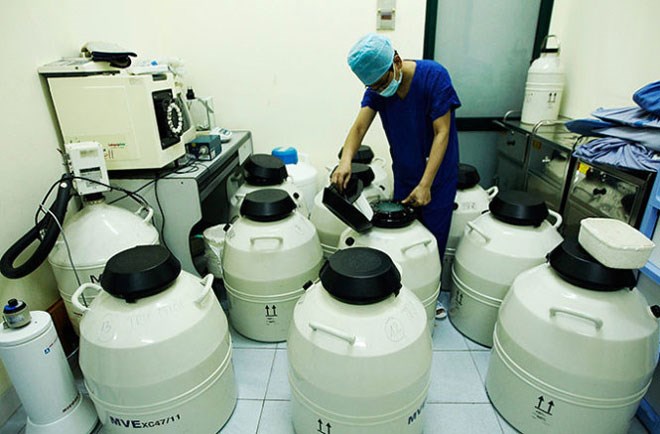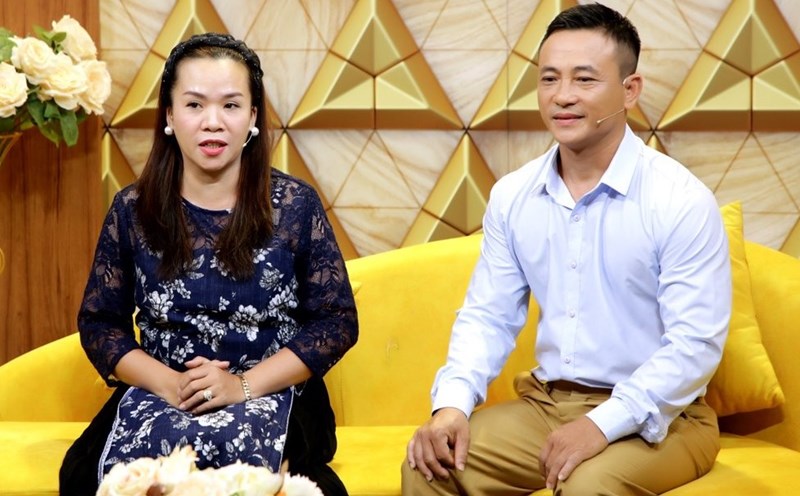Many women ask for sperm donations to become "single moms"
After a long time of thinking, Ms. Le Thanh Thuy (born in 1987, in Hanoi) decided to become a single mother. "I had this intention when I just turned 30, but I hesitated for a long time before deciding to do it. I thought that if I didn't want to get married but wanted to be a mother, the only way was to find a source of donated sperm," Ms. Thuy said.
To make this decision, Ms. Thuy has prepared everything from mindset to economy. “Requesting sperm to have children is considered a personal right of single women in many developed countries. However, in Vietnam, many people are concerned about ethical issues and social impacts. I have to overcome myself as well as make my relatives think,” Ms. Thuy added.
After a successful transfer at a considerable cost, now entering the final days of her pregnancy, Ms. Thuy is eagerly awaiting the arrival of her child.
Doctor Tang Duc Cuong - Director of Dong Do IVF Center, Dong Do Hospital - said that, based on Clause 1, Article 3 and Article 5 of Decree 10/2015/ND-CP, single women have the right to give birth with assisted reproductive techniques if prescribed by a specialist. In case single women have eggs of guaranteed quality and want to give birth, they have the right to request/receive sperm to give birth themselves.

In addition to legal regulations, whether unmarried women can successfully perform assisted reproductive methods or not also depends on the health status of each person. Because a woman's fertility depends largely on age. As she gets older, ovarian reserve and egg quality decrease, and endocrine and reproductive problems increase. Therefore, the success rate of assisted reproductive methods at each age will be different.
Currently, there are some facilities that make single women’s dream of becoming mothers come true by asking for donated sperm. Doctor Tang Duc Cuong said that Dong Do Hospital performs this technique but the number of times it is performed is not much. Single mothers can ask for anonymous sperm to become mothers at many licensed facilities.
According to Dr. Tang Duc Cuong, single women have the right to perform assisted reproductive techniques such as artificial insemination (IUI) and in vitro fertilization (IVF) to become single mothers if they meet the following conditions: 20 years of age or older, have full civil capacity, have good reproductive health, have never been married or divorced, divorced, spouse has died, do not have dangerous infectious diseases, have a certificate of singleness issued by the People's Committee of the commune/ward where they reside.
Vietnamese law allows single women to request sperm and embryos (a product of a combination of eggs and sperm) to have children using assisted reproductive methods, as prescribed by a specialist.Currently, there are 53 reproductive support centers nationwide.All of these units can perform IVF, focusing mainly on three groups of customers: homosexual couples who want to have children, divorced women and women who have never been married.
The trend of liking to be single
In Vietnam, according to statistics from the General Statistics Office, the rate of single people tends to increase rapidly, the rate of single people increased by 3.87% in 15 years (2004 - 2019). A part of young people today choose to focus on their careers, experience many new things, learn new skills to improve themselves.
Nguyen Huong Phuong (born in 1995, in Hanoi) is working at a bank and intends not to get married but wants to be a mother. Huong Phuong herself has a rather different lifestyle. Since childhood, she was a girl, but as she grew up, Phuong's style and personality became more masculine. Worried about her daughter's changes, Phuong's mother "whispered" to get her daughter to agree to go for a health check. Phuong is completely healthy and a real woman. Phuong does not want to get married but in the future Phuong still wants to be a mother.
"Currently, many people still have an "unopen" view of this. In Vietnam, many people are concerned about ethical issues and social impacts. Traditional concept: In Vietnam, families usually include parents and children. Single women raising children can cause pressure from public opinion. Children's rights: Children born through artificial insemination can face psychological challenges when lacking a father figure. Hopefully in the future, single women becoming mothers will be viewed more openly. Asking for sperm to have children is considered a personal right of single women in many developed countries" - Huong Phuong frankly shared.
At Tam Anh General Hospital, the procedure for requesting sperm for single mothers requires a certificate confirming that you are single. To request sperm, the person in need must mobilize a male over 20 years old to volunteer to donate sperm. In Vietnam, the use of sperm samples will be carried out anonymously. Therefore, after going through the steps of checking and screening, if the male donor meets the requirements, the donor's sperm sample will be received in the bank and "exchanged" with another sample to ensure confidentiality.
The donor and the recipient will not know each other's contact information. The sperm donor is completely exempt from legal obligations for the baby born from the donated sperm (if any). The sperm donor guarantees that he/she voluntarily donates sperm only at the Center for Assisted Reproduction (IVFTA) HCMC. This means that the sperm donor only voluntarily donates to a single center, which is licensed by the Ministry of Health to perform assisted reproductive techniques.
Donated sperm can only be used for one person after donation. In case the couple/single woman fails to conceive a child but does not want to use the remaining sperm, the sperm sample will be destroyed (note: the remaining sperm cannot be used by another couple). In case of successful conception (one baby), the unused sperm sample will be destroyed.
According to Dr. Giang Huynh Nhu - Director of IVFTA-HCMC Reproductive Support Center, when interacting with women who decided to become single mothers, they often asked whether or how to tell their children when they found out they were born from a sperm bank.
One thing at IVFTA-HCMC is that all cases with indications for sperm bank requests are subject to psychological counseling. This is a mandatory assessment that helps support patients with future choices, how to face and receive questions from their children, when the woman decides to tell the baby born from the sperm bank, when to tell and how to tell.
*Character names have been changed.











